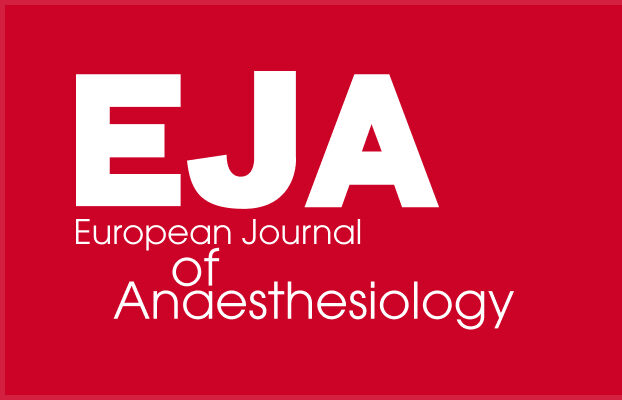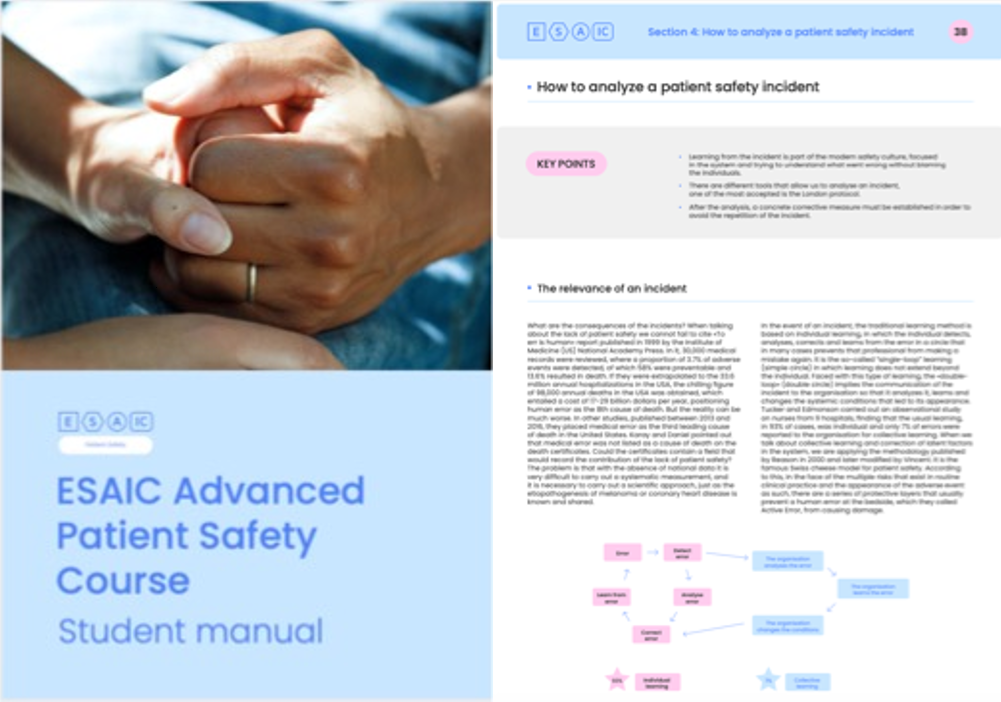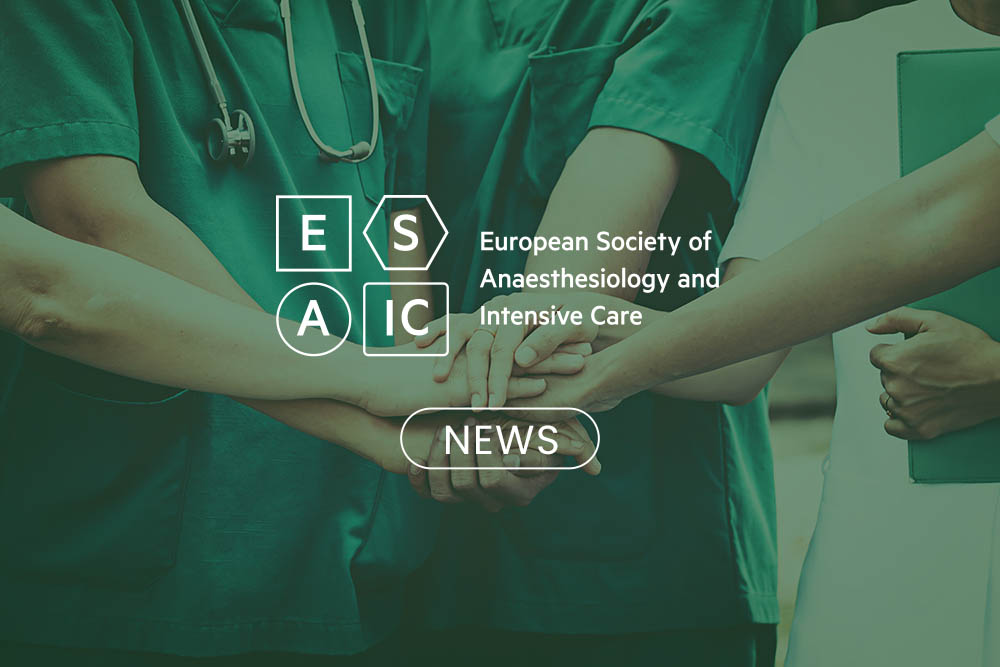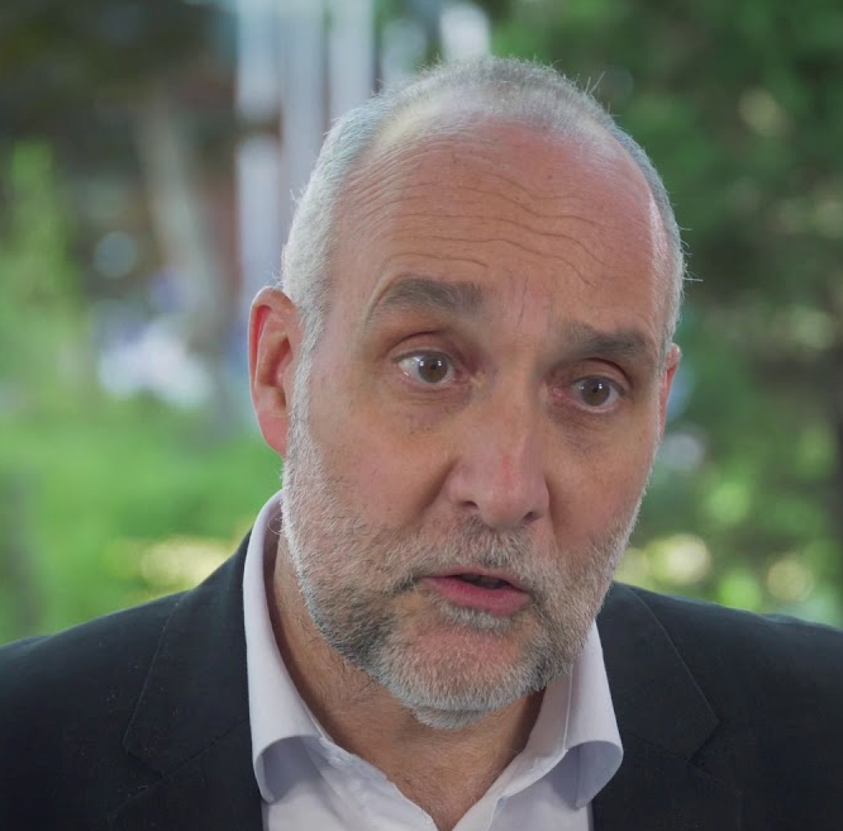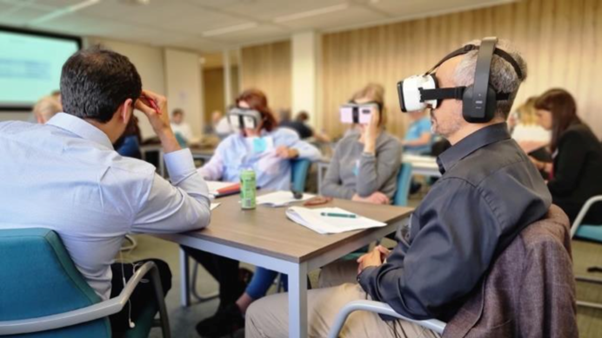Newsletter 2023
Patient Safety Education of the ESAIC
Prof. Benedikt Preckel
Chair of the ESAIC Patient Safety and Quality Committee
Safer Care to Save Lives
Together with healthcare leaders and practitioners, the ESAIC is dedicated to leading the way in patient safety and ensuring the best care for every patient. We have a core vision for our contribution towards Patient Safety: Healthcare that is free from preventable patient harm.
During the last years, the ESAIC Patient Safety and Quality Committee and its Industry Partners developed a Patient Safety education project: the Safer Care to Save Lives, a comprehensive package of Patient Safety education for anaesthesiologists, healthcare professionals, hospital management and patients. The Patient Safety Training Programme is a complete training path aimed at providing key knowledge on patient safety in acute settings: intensive care, anaesthesiology, perioperative care and emergency settings. It is built on the overarching principles of the Helsinki Declaration on Patient Safety in Anaesthesiology.
Our vision is that every acute care setting healthcare provider in Europe will receive and be certified in ESAIC patient safety training as part of their continuing education program. Every patient and relative will have an education program to be able to participate in their own safety.
This package includes the following content:
I. The ESAIC Essential Patient Safety Course, a series of eLearning modules for those starting with an interest in patient safety
The EPSC is built on the Helsinki Declaration for patient safety overarching principles. Through the 5 modules of the training programme, participants will learn the key dimensions of the Helsinki Declaration, understand issues related to system complexity and human factors and train in using common quality and safety improvement tools. The programme is a stand-alone course that provides all the theoretical content required for the Advanced Patient Safety Course (APSC) and the Patient Safety Masterclass (PSQ Masterclass).
The EPSC is open to all healthcare professionals (i.e. anaesthesiologists, surgeons, nurses, nurse anaesthetists and other healthcare professionals) having a MyESAIC account and is free of charge for ESAIC members. The programme includes a series of 5 different lectures, with Videos, Podcasts, Theoretical content and interactive exercises and scenarios. It also includes updated reading on the topic and a Short auto-evaluation test that closes each module. The Essential Patient Safety Course (EPSC) is held as an online course all year round.
The EPSC is equivalent to a 2 full-day training course with 5 modules of 3 hours. The programme covers a wide range of safety and quality-related topics. It will enable participants to learn key concepts and practise quality and safety improvement strategies that they can use in their clinical setting. The first modules have already been published in the ESAIC Academy. Others will follow soon.
- Module 1. Definitions and Helsinki Declaration (published online in September 2023)
- Module 2. Human Factor to improve patient safety (published online in September 2023)
- Module 3. Understanding system complexity
- Module 4. Common Safety Issues in Anaesthesia
- Module 5. Common safety improvement strategies (i.e. guidelines, pathways, reporting)
II. The ESAIC Advanced Patient Safety Course, a certified course for those more advanced in their understanding of patient safety topics
The ESAIC Advanced Patient Safety Course is a live 1.5-day course to teach patient safety tools that can be used in acute settings. We offer modern teaching using interactive group work and innovative 360-degree videos of key scenarios, followed by debriefing, to bring examples of critical situations to life. Topics covered include interactive settings for safety culture, patient safety tools, human factors, incident reporting and learning from errors, systems analysis, how to analyse a safety incident, crisis management, teamwork, communication and situation awareness, as well as patient advocacy and patient safety advocacy.
The APSC is provided as a cascade training programme by ESAIC in collaboration with national training structures called International Training Centres (ITC).
Healthcare professionals attending 100% of the ASPC who pass the course assessment will hold the ESAIC Advanced Anaesthesia and Intensive Care Patient Safety Certificate. The APSC is aimed at all Health care professionals, patients and stakeholders interested in patient safety in acute settings: Intensive Care, Perioperative Care, Anaesthesia, Emergency Care and other settings where acute patients are treated.
Quotes from former participants:
“ Fantastic course, a must for every anaesthesiologist. Should be in the basic package of the training.”
“ I highly recommend taking this course as it gives us a condensed perspective on patient safety and allows us to exchange experiences among different healthcare systems and countries.“
“Excellent course with high-quality education materials – the videos were interesting and well-made, and the manual is superb. Loved the discussion on the course with colleagues from other countries – there was a real sense of openness and honesty from all participants.”
APSC Student Manual
A digital student manual is available as a guidebook through the APSC’s live programme. This book provides support as immediate pre-reading and course documentation with the rationale for the course contents, concept highlights and working sheets for the 360º workshops. Student books can be translated into national languages by the national society if needed.
Figure: Example pages of the APSC Student Manual
APSC Teach the Teacher (TTT) Courses
APSC faculty candidates for international courses organised by the ESAIC are recruited from previous APSC attendees who followed the TTT course. The ESAIC provides the APSC Teach the Teacher Course to society members who have already attended an APSC event – this will be done online in an interactive 2 times 3 h session. A digital teacher’s manual will be available as a guidebook through the live program. This book will focus on the educational methodology and provide support for every APSC session with the rationale for the course contents and concept highlights to be discussed with the attendees. Trainer’s manuals might also be translated into national languages by the national society if needed.
The next APSC will take place in February 2024 in Istanbul. More information can be found at
https://www.esaic.org/event/esaic-advanced-patient-safety-course/
III. The ESAIC Patient Safety and Quality Masterclass
The Patient Safety and Quality Masterclass is an advanced scientific workshop dedicated to learning principles and practices of patient safety, clinical risk management and quality of care.
It is an intensive 2.5-day workshop built on maximising interaction between attendees through small group learning and sessions requiring participation. While we can generally cover a wide variety of safety- and quality-related topics, we have a diverse faculty selection that enables participants to focus on particular interest topics in their clinical settings and target their needs to maximise their learning benefits.
Quotes from recent participants:
“This is the best master class/workshop I have been to. I find it very relevant to my work in research as a leader and clinician. It was a very good mix of participants with different levels of experience. It is also the first time I have experienced the patient’s perspective in reality in a workshop, and I found this very inspirational. My only criticism is that this class should have been announced much earlier.”
“This program was exactly what I was looking for in a safety masterclass. A good mix of theory and its practical applications. The faculty was knowledgeable, and discussions with them and the other participants were enlightening. The use of clinical cases to put the theory to practice was very useful and kept the flow throughout the course.”
This course is aimed at anaesthesiologists, nurse anaesthetists, other perioperative clinicians/staff and hospital administrators with experience in patient safety. They are motivated to be patient safety and quality champions in their departments. The focus is on perioperative patient safety.
The Patient Safety and Quality Masterclass has a different programme to the Advanced Patient Safety Course. It provides a deeper look into Patient Safety issues for participants of different levels, including those new to the subject. The aim is to establish a firmer foundation in the different areas and topics that make up the field of Patient Safety. Topics covered in this masterclass include human error, human factors, safety science, psychology, drift, cognitive aids, teamwork, resilience engineering, patient’s perspective, quality indicators, evidence-based patient safety, communication and connection, critical incident debriefing and analysis, communication with patient relatives as well as second victims.
The next PSQ-Masterclass will take place in Autumn 2024 and will be announced in due time.





